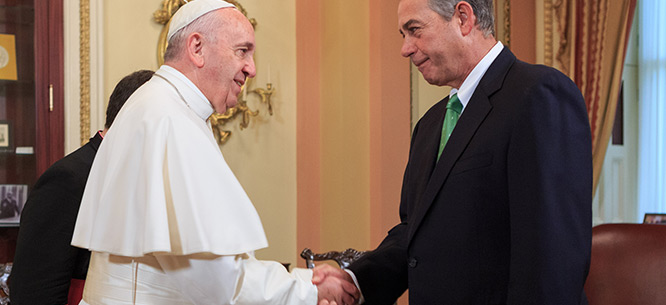by SUSAN JACOBY
 John Boehner, the then Speaker of the US House of Representatives, welcomes Pope Francis to the U.S. Capitol, September 24, 2015 PHOTO/John Boehne/Flickr
John Boehner, the then Speaker of the US House of Representatives, welcomes Pope Francis to the U.S. Capitol, September 24, 2015 PHOTO/John Boehne/Flickr
In 2013, when the Texas legislature debated and passed a law—now under review by federal courts—designed to sharply reduce access to legal abortion in the nation’s second most populous state, Senator Dan Patrick asked his colleagues, “If you believe in God, how would God vote if he were here?”
Then Patrick, who has since ascended—albeit through an earthly election—to the office of lieutenant governor, suggested that people who pray to God in times of tragedy (yes, he played the 9/11 card) are hypocrites if, when the issue involves abortion, they say, “‘no, no, God, sorry, we’re not with you on this one.’”
This quote is not funny, though some liberal media commentators mistakenly treated it as a joke. It is, rather, a stellar example of the danger of using religion as a rationale for decidedly non-celestial political decisions. The minute a politician claims to speak for God in any argument, the purpose is not to further democratic negotiation but to shut off discussion. Thus sayeth the Lord. Case closed.
Religious believers—like secular Americans—have a perfect right to voice their moral convictions in public policy debates. When believers live out their faith instead of bloviating about it, as demonstrated last summer in the expressions of devout Christian forgiveness by the families of African Americans murdered in a Charleston church by a white supremacist, they are even more effective in influencing public opinion.
What believers do not have a right to do is enshrine their precepts as universal morality that overrides the democratic process and must be obeyed by fellow citizens—religious or nonreligious—of different beliefs. Unearned religious forgiveness, for example—however admirable many Americans may find it as a personal moral gesture—has no place in the criminal justice system. At the other end of the religious spectrum, the endlessly cited “eye for eye” quote from Exodus offers no justification for capital punishment today.
In our pluralistic society, religious parents would rightly be outraged if I were permitted to lecture their children about my atheist convictions in public schools. But secular and non-fundamentalist religious parents in Louisiana must live with a legislative fiat, endorsed by Republican Governor Bobby Jindal, that allows public schools to present the creation myth in Genesis as a valid alternative to settled science.
…
I am an admirer, not a worshipper, of the men who forged the American Revolution. Trying to discern the “original intent” of the founders is rather like drawing conclusions about modern social issues from the Bible. Men like John Adams and Thomas Jefferson wrote so much—like the authors of the Scriptures—that you can find almost anything you want in their opinions. Did these men of the Enlightenment contradict themselves? Yes, they did—they contained multitudes.
But one thing is clear (pace Justice Scalia): the framers never intended to create a “Christian nation” or even a religion-based government. If they had, they would have said so in the Constitution—and the deliberate omission of God from the nation’s basic legal framework continues to pose a troublesome barrier for preacher-politicians. Religious conservatives in the nineteenth century never thought that the United States had been established as a Christian nation, or they would not have tried repeatedly (and unsuccessfully) to promote a “Christian amendment” to the Constitution.
Dissent for more
